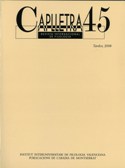Adaptació escolar, actituds i aprenentatge del català en l'alumnat de les aules d'acollida de Primària i Secundària a Catalunya (2005-2006)
DOI:
https://doi.org/10.7203/caplletra.45.4792Palabras clave:
Bilingual education, late incorporation, immigration, learning of Catalan Resumen
Resumen
In the last years a very important amount of immigrant students unaware of Catalan, a language typical of the educational system of Catalonia, have arrived to Catalonia. To face this situation an organizational educative model, known as
newcomers classrooms, was started in 2003. It aims at speeding up the access of immigrant students to Catalan conversational uses in order to facilitate their school integration.
This article presents a study that evaluates the results of newcomers classrooms, using as data the whole number of students that attended them in the course 2005-2006: 10.043 pupils of primary education (of 591 schools) and 6.474 pupils of
secondary education (of 332 secondary schools). For the research two sets of tests were used: one about the knowledge of Catalan and another one about integration and school adaptation.
The results show that newcomers classrooms’ students manage to learn the Catalan language, but also show that there are differences between the several linguistic collectives, due to, among other factors, the attitudes towards the school institution
and their self-esteem, as well as to the particular characteristics of their initial language.
The study demonstrates that all these factors are related. In consequence, the explanation of the differences about the knowledge of Catalan can not be made from isolated factors but from their interaction.
 Descargas
Descargas
Descargas
Publicado
Cómo citar
-
Resumen714
-
PDF (Català)441
Número
Sección
Licencia
El autor o autora que dirija un trabajo a la redacción de Caplletra para ser publicado tiene que ser la persona titular legítima de los derechos de explotación. La legitimación para la publicación del trabajo tiene que incluir también las imágenes, las tablas, los gráficos y otros materiales que puedan complementar el texto, con independencia de si es su autor o autora.
Copyright. Al publicar el trabajo en la revista, el autor o autora cede a Caplletra. Revista Internacional de Filologia los derechos de explotación (reproducción, distribución y comunicación pública), tanto para la edición impresa en papel como para la versión electrónica.
Todos los trabajos publicados en Caplletra se encuentran bajo una licencia Creative Commons del tipo Reconocimiento-NoComercial-SinObraDerivada 4.0.
RESPONSABILIDAD
Caplletra. Revista Internacional de Filologia no se identifica necesariamente con los puntos de vista sostenidos en los trabajos que publica.Caplletra. Revista Internacional de Filologia declina toda responsabilidad derivada de cualquier vulneración eventual de los derechos de propiedad intelectual que pudiera ser llevada a cabo por los autores o autoras.






